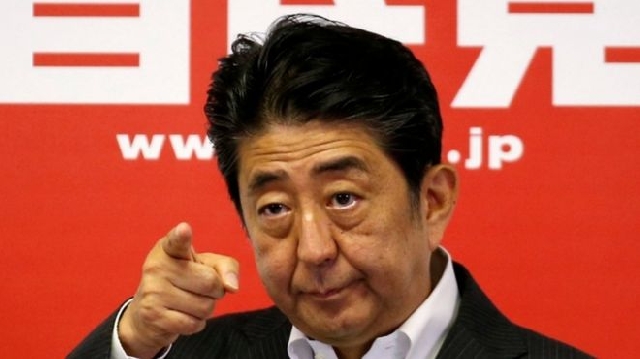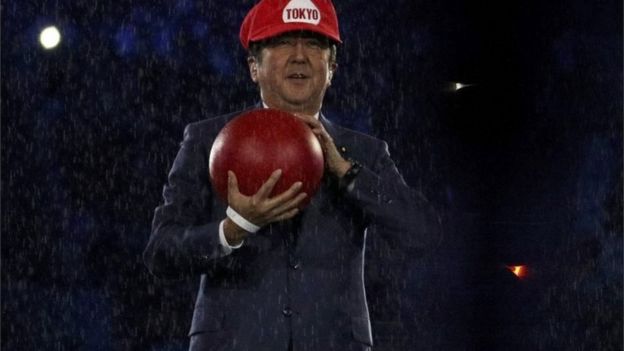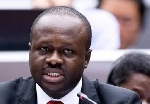Shinzo Abe, Japan's PM, to resign for health reasons
 Shinzo Abe
Shinzo Abe
Japanese Prime Minister Shinzo Abe is set to resign for health reasons, officials from his LDP party say.
He has suffered from the disease ulcerative colitis for many years but his condition is thought to have worsened recently.
Public broadcaster NHK said Mr Abe, 65, wanted to avoid causing problems for his government.
Earlier this week, he became Japan's longest continuously serving prime minister, after taking office in 2012.
In 2007 he resigned abruptly from an earlier term as prime minister because of his struggles with ulcerative colitis, a chronic condition affecting the large intestine, that he has lived with since he was a teenager.
Mr Abe has a reputation as a staunch conservative and nationalist, and for stimulating growth with his aggressive economic policy known as "Abenomics".
He has strengthened Japan's defences and boosted military spending, but has been unable to revise the constitution's pacifist Article 9, which bans a standing army for anything other than self-defence.
Why are there concerns?Two hospital visits in one week sparked questions about whether Mr Abe's health was deteriorating. He had been due to serve until September 2021.
He has not revealed what the visits were for but one is reported to have lasted nearly eight hours.
Officials from his governing Liberal Democratic Party (LDP) have previously dismissed speculation that he would step down, saying the prime minister's health was fine.
On Tuesday one of his aides told Reuters that he thought Mr Abe would fulfil his tenure.
 Image copyrightREUTERS
Image captionAt the Rio de Janeiro Olympics in 2016 Mr Abe appeared as video game character Mario
Image copyrightREUTERS
Image captionAt the Rio de Janeiro Olympics in 2016 Mr Abe appeared as video game character Mario
Akira Amari, head of the LDP's tax panel, dismissed the suggestion that the prime minister would dissolve parliament's lower house for a snap general election soon.
"There won't be a snap election for the time being," he said.
Still, rumours have persisted about Mr Abe's growing fatigue as he fields growing scrutiny for his handling of the coronavirus pandemic, at a time when approval ratings for his cabinet have dropped.
What happens if Mr Abe is incapacitated?Under Japanese law, an acting prime minister would step in temporarily if Mr Abe were unable to perform his role, with no limits on how long they can stay in post.
Deputy Prime Minister Taro Aso, who is also finance minister, is first in line, followed by Chief Cabinet Secretary Yoshihide Suga.
An acting prime minister cannot call a snap election but they lead on other matters such as treaties and budgets until a new party leader and premier is chosen.
What happens if Mr Abe resigns?A resignation or an announced intention to resign would trigger a vote within Mr Abe's LDP to replace him as president.
This election would be followed by a parliamentary vote to elect a new prime minister.
The winner would hold the post until the end of Mr Abe's term in September 2021.
Source: BBC
Trending News

Jospong Group upscales Climate Change resilience efforts
02:14
Akufo-Addo’s tenure has left cocoa communities poorer – Joyce Bawah
22:54
Rawlings remembered as ‘The People’s Man’ on 4th anniversary of his passing
09:45
All must jealously guard, protect Ghanaian journalists: Agortime-Ziope MP urges
21:05
Kufour: Bawumia is the best man Ghana needs at this moment in our history
09:00
2024 polls: Omane Boamah tells NDC agents to insist EC posts pink sheets at polling stations
09:22
V/R: Lawyer petitions municipal assembly, NPP to address unlawful mounting of advertising, political signs on Ho road
20:50
Other countries are exploring Mars, we're here struggling with waste – Assin Kushea Paramount Chief fumes
02:39
Elections 2024: We'll know 75 % of our results by 11 pm – Omane Boamah
10:25
My Husband is honest, he has solutions to Ghana’s problems – Samira Bawumia
08:01




